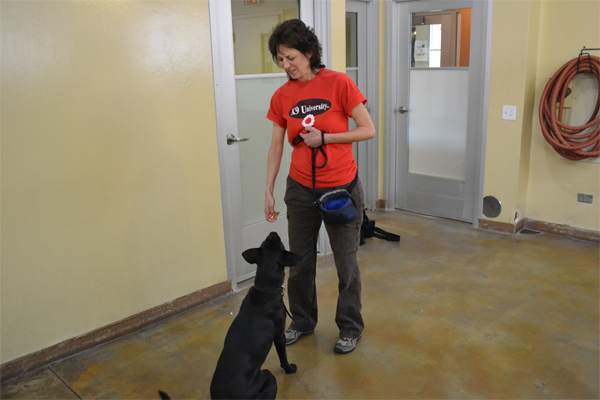When Training Isn’t Enough
by Joan Harris | Oct 31, 2012
Your pup needs more than basic obedience. Bringing home your new dog from the Adoption Center is an exciting day! Getting to know your new pet’s habits, likes and dislikes is a fun adventure. Just like people, dogs have their own unique personalities and sometimes there are a few bumps in the road.

When they first arrive in their new homes, some dogs may feel as if they are in a foreign country where they don’t speak the language. They are introduced to their new family and they are unaccustomed to the rules of their new household. This can be frightening or overwhelming and contacting an experienced dog trainer may be helpful. Training can help your dog overcome the language barrier and help teach appropriate behaviors.
A dog cannot be expected to have good manners without learning basic obedience skills. These skills include basic leash behavior, greetings, coming when called, sitting, lying down and staying. Sometimes dogs may have a little trouble with exercises that require a degree of impulse control due to their age or stage of development. These problems can usually be rectified with additional training, patience and work.
Many house training problems also fall into this category. Sometimes puppies are not given proper guidance and they grow into adult dogs who still have accidents in the house. Crate training and supervision can usually get the dog back on track. Many problems can be managed by simply providing structure or by giving the dog more exercise and enrichment.
But sometimes this isn’t the case. Dogs, like people, can develop fears and phobias from traumatic experiences or neglect. These anxieties can prevent a dog from learning or developing any degree of emotional stability. Behavioral problems are mental or emotional disorders that are not related to training. Although training may help, it doesn’t solve the problem. Some behavioral problems may also have an underlying medical issue.
In this case, it is important to contact your veterinarian for a medical or behavioral diagnosis. Your veterinarian can then determine the next step. Your veterinarian may give you a treatment plan or refer you to a veterinary behaviorist. A veterinary behaviorist must complete a two-year residency under the guidance of a board-certified veterinarian. They are professionally certified as Diplomates of the American College of Veterinarian Behaviorists (ACVB). Veterinary behaviorists are knowledgeable in psychopharmacology and may incorporate medication in certain cases. They use techniques that are used in psychiatry and psychology including behavior modification and life style changes.
Many times your veterinarian or veterinarian behaviorist may include an experienced trainer to help implement their training plan. In this situation, it is important that the veterinarian, trainer and client all work together and keep the lines of communication open. The most important thing to remember is that there are qualified professionals out there to help. Seek help from these professionals before the frustration of dealing with a behavior problem becomes overwhelming. You and your dog will both be happy that you did!
Consult your veterinarian or a veterinary behaviorist if your dog exhibits:
- Aggression toward people, including children
- Aggressive conflicts between housemates
- Anxiety, Fears and Phobias
- Separation Anxiety Syndrome
- Compulsive behaviors
- House training problems that don’t improve
- Aggression toward other dogs or extreme reactivity while walking on leash
